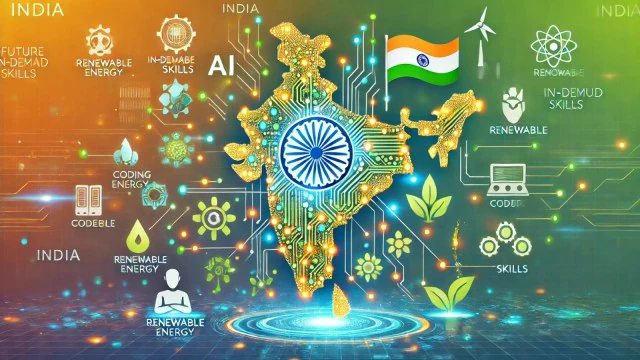
India has been recognized as a leader in preparing for the jobs of the future, with the latest QS World Future Skills Index 2025 placing the country second in job market readiness. This ranking underscores India’s significant strides in aligning with future job requirements, particularly in the fields of artificial intelligence (AI) and green skills, which are increasingly critical in a rapidly evolving global workforce.
The QS Future Skills report highlights India’s unique demographic advantage. While many nations grapple with the challenges of aging populations, India benefits from a young, vibrant workforce, making it well-positioned to embrace the evolving demands of the global job market. According to the Vice President of Strategy and Analytics at QS, this demographic gives India an edge, offering multiple opportunities for growth and development in key sectors.
India’s second-place ranking in terms of readiness for AI and green skills places it only behind the United States, which leads globally in these critical areas. This performance reflects India’s growing expertise and commitment to building a workforce that is prepared for the next generation of industries, including renewable energy, AI applications, and sustainable practices.
Despite this strong showing in specific areas, India’s overall ranking is 25th, which places it in the category of “future skills contender.” The index evaluates countries across several indicators, including the alignment between the skills of the workforce and the needs of employers, academic preparedness, and the capacity for economic transformation. India’s ranking suggests that while it has made significant progress, there is still room for improvement in other areas, particularly in the overall alignment of skills with employer demands and the integration of these skills into academic curricula.
India’s “future skills contender” status reflects its potential to make further advancements in developing a workforce that is ready for the challenges of the future. The country excels in specific indicators, such as workforce adaptability and a focus on emerging technologies. This adaptability is crucial in a world where rapid technological change is reshaping industries across the globe.
However, despite these strengths, India lags behind in areas such as academic readiness and the integration of new skills into educational institutions. The report highlights that there is a need for further investments in educational infrastructure, curriculum development, and industry-academic partnerships to better align the skills of future workers with the requirements of modern employers.
The countries that rank higher in the index, such as the USA, UK, Germany, Australia, and Canada, are categorized as “future skills pioneers.” These nations have made considerable investments in their education systems, ensuring that workers are not only prepared for the current job market but are also equipped with the skills needed for emerging industries.
India’s success in AI and green skills reflects the growing importance of these areas in global job markets. As industries worldwide shift towards sustainability and automation, the demand for skilled workers in these fields will continue to rise. India’s ability to train and develop workers with expertise in AI, machine learning, and renewable energy positions it well for future economic growth.
Additionally, India’s large, youthful population provides a steady supply of workers who are increasingly tech-savvy and open to learning new skills. As the country’s education system continues to evolve, there is tremendous potential for India to enhance its ranking in the future skills index, particularly in terms of overall workforce preparedness and academic alignment.
The report underscores the importance of continuous investment in education and skills development. Countries like India that have a strong foundation in key areas such as AI and green skills must focus on bridging the gap in other areas, including academic readiness and the integration of emerging technologies into mainstream education. This will ensure that the workforce remains competitive and adaptable in the face of ongoing technological advancements.
India’s performance in the QS World Future Skills Index 2025 reflects its growing prominence in the global job market. While the country faces challenges in certain areas, its rapid progress in AI and green skills demonstrates its commitment to preparing the next generation of workers for the future. With continued investment in education, technology, and infrastructure, India has the potential to rise even further in future rankings and solidify its position as a global leader in workforce development.







